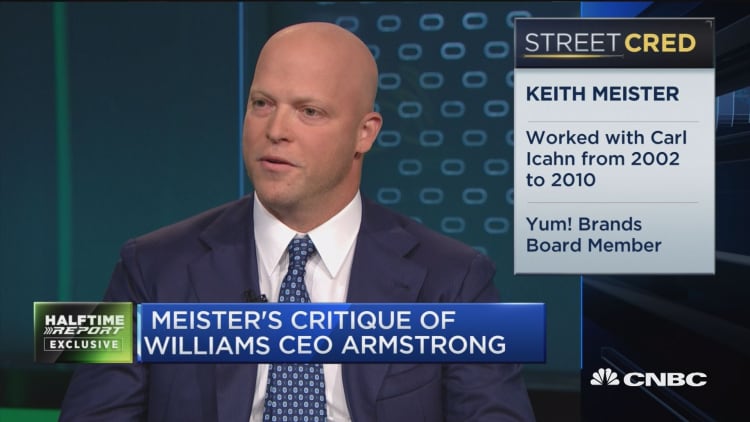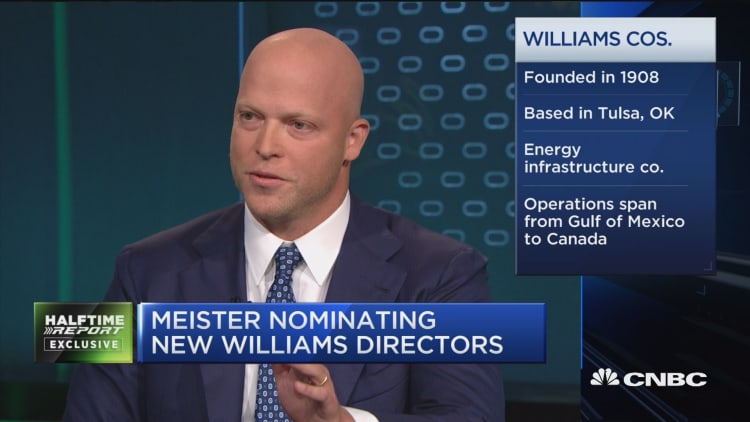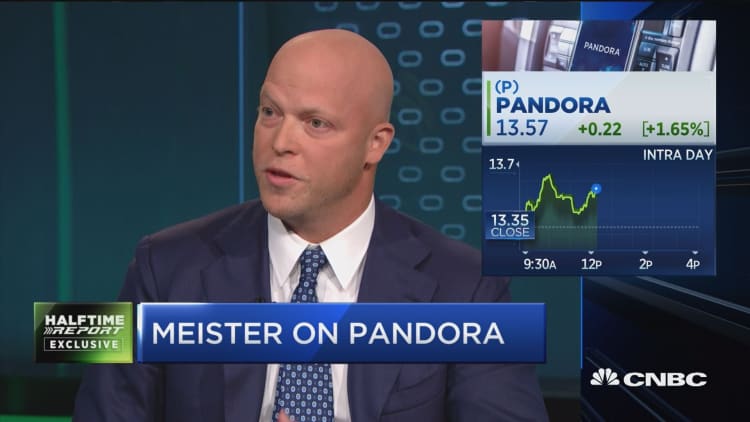


Activist investor and Corvex Management founder Keith Meister said Monday he will seek to nominate a slate of up to 10 directors to the board of the Williams Companies, effectively launching a proxy battle against the natural gas pipeline operator.
The nominees will be Corvex employees who will serve as placeholders until Corvex can solicit the best permanent independent directors and present them to shareholders in the coming months, Meister told CNBC during an exclusive interview on "Fast Money: Halftime Report."
"When you vote for our slate, what you will be voting for is effectively the right to elect those people," he said. "You will know who they are in advance. So our slate will get elected, appoint the new slate, and resign."
Shares of the Williams Companies are up about 12 percent since Alan Armstrong became CEO in January 2011, but have slumped nearly 45 percent in the last 12 months.
Meister, one of Williams' biggest shareholders, was one of six directors who stepped down from the Williams board in June following an unsuccessful effort to unseat Armstrong. The directors left over a difference of management and the perception that the six remaining board members were not able to assist and hold Armstrong accountable, according to Meister.
"In sum, I'd say it's very much a 1970s board, where there are six directors whose qualifications I would question. They're not the best draft picks to be on the board and they've gotten on by being very loyal and supportive of a CEO whose record has failed to meet expectations," Meister said.
Meister said he and the directors lost confidence in Armstrong over Williams' inability to close a deal to be sold to Energy Transfer Equity. In addition, he said, Williams missed financial expectations, saw growth projects fail and had a poor safety history over the course of five years.
Meister said he was forced to launch the proxy battle after Williams declined to adopt a plan to nominate a majority of seven independent directors to its board.
Williams Cos. declined a request from CNBC to appear on air or to comment on the current dynamic with Meister prior to the "Fast Money: Halftime Report" interview.
Williams had previously said it plans to appoint three new, independent directors. The deadline for shareholders to nominate candidates for Williams' board of directors is Thursday.
"The problem with adding just three is, I'm sure they'll add great directors, ... but just having three great directors is not going to help," Meister said. "We had six great directors. They resigned because the were directed by the six others, or seven if you include Alan."
Meister said the move to overhaul the board gained further urgency after he learned Williams had turned down an offer by Enterprise Products Partners to combine their businesses. Meister said he could not judge the deal because he did not know the terms presented, but said the board and management owed it to shareholders to entertain it.
"The sense I got is Enterprise, which is a world class company, with the key thing in this industry — great assets, low cost of capital, strong balance sheet — made a proposal to acquire Williams at a reasonable public company premium and the incumbent Williams board, the legacy directors, took a 'just say no' approach," he said.
Reuters first reported the overture last Thursday. Enterprise's approach came after peer Energy Transfer Equity terminated its merger agreement with Williams in June after a prolonged legal battle.
Since the deal with Energy Transfer broke up, Tulsa, Oklahoma-based Williams has laid out plans to move forward as a stand-alone company while investing more than $1.5 billion in its master limited partnership, Williams Partners LP. Williams and Williams Partners have taken steps to sell assets to reduce their debt loads.
— Reuters contributed to this story.


